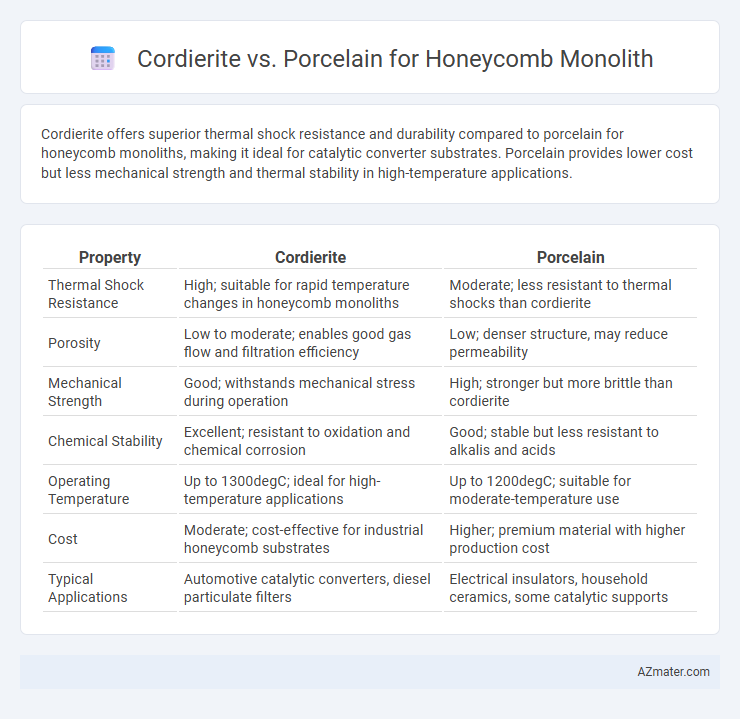Cordierite offers superior thermal shock resistance and durability compared to porcelain for honeycomb monoliths, making it ideal for catalytic converter substrates. Porcelain provides lower cost but less mechanical strength and thermal stability in high-temperature applications.
Table of Comparison
| Property | Cordierite | Porcelain |
|---|---|---|
| Thermal Shock Resistance | High; suitable for rapid temperature changes in honeycomb monoliths | Moderate; less resistant to thermal shocks than cordierite |
| Porosity | Low to moderate; enables good gas flow and filtration efficiency | Low; denser structure, may reduce permeability |
| Mechanical Strength | Good; withstands mechanical stress during operation | High; stronger but more brittle than cordierite |
| Chemical Stability | Excellent; resistant to oxidation and chemical corrosion | Good; stable but less resistant to alkalis and acids |
| Operating Temperature | Up to 1300degC; ideal for high-temperature applications | Up to 1200degC; suitable for moderate-temperature use |
| Cost | Moderate; cost-effective for industrial honeycomb substrates | Higher; premium material with higher production cost |
| Typical Applications | Automotive catalytic converters, diesel particulate filters | Electrical insulators, household ceramics, some catalytic supports |
Introduction to Honeycomb Monolith Materials
Cordierite and porcelain are prominent materials used in honeycomb monoliths due to their thermal stability and mechanical strength. Cordierite offers excellent thermal shock resistance and low thermal expansion, making it ideal for catalytic converters and diesel particulate filters. Porcelain provides high chemical durability and structural integrity, often favored in industrial filtration and emission control applications.
What is Cordierite?
Cordierite is a magnesium iron aluminum cyclosilicate known for its excellent thermal shock resistance and low thermal expansion, making it ideal for honeycomb monolith substrates in catalytic converters. Its robust structure withstands rapid temperature fluctuations common in automotive and industrial applications, enhancing durability and performance. Compared to porcelain, cordierite offers superior mechanical strength and thermal stability, crucial for efficient exhaust treatment systems.
What is Porcelain?
Porcelain is a dense, high-strength ceramic composed primarily of kaolin, feldspar, and quartz, known for its excellent thermal stability and resistance to chemical corrosion. In honeycomb monolith applications, porcelain offers superior thermal shock resistance and durability compared to cordierite, making it suitable for high-temperature environments such as catalytic converters and diesel particulate filters. Its fine microstructure and low porosity enhance filtration efficiency and mechanical strength, optimizing performance in automotive and industrial exhaust systems.
Key Differences: Cordierite vs Porcelain
Cordierite honeycomb monoliths offer superior thermal shock resistance and lower thermal expansion compared to porcelain, making them ideal for high-temperature applications such as automotive catalytic converters. Porcelain honeycomb monoliths generally provide better chemical stability and corrosion resistance, suitable for environments with aggressive chemical exposure. Manufacturing processes for cordierite involve advanced ceramic sintering that enhances durability, while porcelain's composition includes kaolin and feldspar, influencing its mechanical properties and cost-effectiveness.
Thermal Properties Comparison
Cordierite honeycomb monoliths exhibit superior thermal shock resistance due to their low thermal expansion coefficient, typically around 2.5 x 10^-6 /degC, enabling them to withstand rapid temperature changes without cracking. Porcelain monoliths possess higher thermal expansion, often exceeding 5 x 10^-6 /degC, making them less resistant to thermal cycling and more prone to structural damage under fluctuating thermal loads. The thermal conductivity of cordierite ranges from 1.3 to 2.5 W/m*K, providing efficient heat dissipation, whereas porcelain varies widely but generally offers lower thermal conductivity, impacting its heat management capabilities in high-temperature environments.
Mechanical Strength & Durability
Cordierite honeycomb monoliths exhibit superior thermal shock resistance and mechanical strength compared to porcelain, making them more durable in high-temperature automotive and industrial applications. Porcelain monoliths, while cost-effective, tend to have lower mechanical strength and are more prone to cracking under rapid temperature changes and thermal cycling. The enhanced durability and crack resistance of cordierite ensure longer service life and reduced maintenance costs in catalytic converter and diesel particulate filter systems.
Chemical Resistance and Stability
Cordierite honeycomb monoliths exhibit superior chemical resistance and thermal stability compared to porcelain, making them ideal for harsh industrial environments with corrosive gases. Porcelain materials, while cost-effective, tend to suffer from lower chemical durability and can degrade under aggressive chemical exposure. The unique crystalline structure of cordierite ensures enhanced resistance to thermal shock and chemical attack, maintaining structural integrity and long-term performance in catalytic converter and filtration applications.
Cost and Manufacturing Considerations
Cordierite honeycomb monoliths typically offer lower manufacturing costs due to their simpler firing processes and readily available raw materials compared to porcelain, which requires higher temperatures and more energy-intensive processing. Porcelain monoliths exhibit superior mechanical strength and thermal stability but demand more complex manufacturing infrastructure, increasing overall production expenses. Cost-sensitive applications often favor cordierite for its balance of durability and affordability, while porcelain is chosen when enhanced performance justifies the higher investment.
Applications in Industry: Cordierite vs Porcelain
Cordierite honeycomb monoliths excel in high-temperature automotive catalytic converters and diesel particulate filters due to their superior thermal shock resistance and low thermal expansion coefficient. Porcelain, while offering good chemical stability, is less favored for automotive applications but finds use in electrical insulators and kiln furniture where mechanical strength at moderate temperatures is critical. Industrial sectors prioritize cordierite for pollutant control applications requiring durability under rapid temperature fluctuations, whereas porcelain is selected for its insulating properties and cost-effectiveness in lower-temperature environments.
Choosing the Right Material for Honeycomb Monoliths
Cordierite offers superior thermal shock resistance and lower thermal expansion, making it ideal for honeycomb monoliths used in catalytic converters operating under fluctuating temperatures. Porcelain provides excellent chemical stability and mechanical strength but generally exhibits higher thermal expansion, potentially leading to cracking under rapid temperature changes. Selecting cordierite is optimal for applications demanding durability and thermal resilience, while porcelain suits environments prioritizing chemical inertness and structural integrity.

Infographic: Cordierite vs Porcelain for Honeycomb monolith
 azmater.com
azmater.com